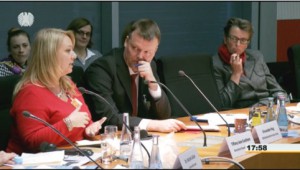EDUCATION FOR PEACE .
An article from the Nonviolent Peaceforce
As violent chaos overwhelms all existing approaches to civilian protection, unarmed civilian protection is gaining attention. Over the past three months, NP has given high-level presentations in Europe, the Middle East and the US.

On February 1, Rolf Carriere, NP board member and senior advisor, spoke at a Brussels forum on Civil Society Perspectives on European Union Implementation of the 2015 UN Reviews. In noting that unarmed civilian protection (UCP) was prominently cited in two UN reviews, Mr. Carriere asserted, “UCP is ready for scaling up. There is almost no conflict where it would not be suitable for these unarmed strategies to be used, especially if the engagement is early on in the conflict cycle, more preventative.”
NP board chair Mukesh Kapila and Tiffany Easthom, NP director for the Middle East, spoke on a panel at the World Bank’s Fragility Forum in Washington DC., March 1-3, where they noted that the sum of the various efforts by international actors is clearly not adequate to today’s needs of rising toll of humanitarian disasters and violence against civilians. They stressed the need to be guided by the local communities, to utilize unarmed approaches and to challenge institutional norms.
Two weeks later, Dr. Rachel Julian of Leeds Beckett University in the UK joined Easthom in Berlin to testify before a subcommittee of the Bundestag. Based on evaluations, case studies and interviews of those involved with nine organizations providing unarmed civilian protection, Dr. Julian has found that UCP changes the behavior of armed actors, helps communities stay at home and saves lives. Ms. Easthom was impressed by the parliamentarians’ high level of knowledge and keen interest to scale up UCP. Mel Duncan followed up with a delegation of German parliamentarians when the visited New York in early April.
(Article continued in the right column)
Can peace be guaranteed through nonviolent means?
(Article continued from the left column)
Chris Holt and Shannon Radsky of NP’s team in South Sudan spent a week in mid-March speaking at parallel events for the UN’s Commission on the Status of Women as well as meeting with UN officials in New York. While affirming the findings of the March 10th UN High Commissioner on Human Rights Report of extreme violence in South Sudan, they went on to detail ways that women are not only victims but also effective agents of civilian protection.
On the religious front, Easthom participated in a retreat sponsored by the World Council of Churches in Beirut where they adopted a strong theme of nonviolent approaches. And Mel will take part in a conference on nonviolence at the Vatican in mid April.
So what does this all mean? Merely a dizzying array of junkets? Or will this advocacy translate into a meaningful increase in the protection of civilians? Dr. Julian observes that a paradigm shift is underway, “One of the most dramatic shifts will have taken place when everyone realizes that, the assumption that an armed actor will not yield to anything except a weapon has been proven to be untrue.”
Together we are proving that point from the bush of South Sudan and bringing the messages to places like Bundestag of Germany.
(Thank you to Janet Hudgins, the CPNN reporter for this article.)